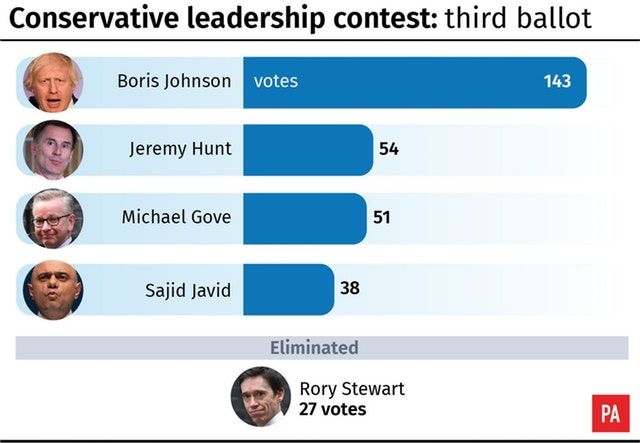 World
World


|
LONDON — Conservative MPs will decide on Thursday who will join Boris Johnson in the final two battling become Britain's next prime minister, with three contenders jostling for the second spot.
Foreign Secretary Jeremy Hunt, Environment Secretary Michael Gove and Interior Minister Sajid Javid are vying to join Johnson on the ballot paper to be put before 160,000 Conservative Party members.
Two rounds of voting are scheduled to whittle the four down to two, though Johnson, barring a spectacular collapse in support, already has more than enough backing to ensure he cruises through.
The last two will then face 16 hustings meetings around the country and two televised debates before Tory party members send in their postal votes to pick a new leader.
The winner will be announced in the week beginning on July 22 and then take over from Theresa May as prime minister.
In Wednesday's third ballot of 313 MPs in the governing, centre-right Conservative Party, former foreign secretary Johnson came first with 143 votes, ahead of Hunt on 54, Gove on 51 and Javid on 38.
International development minister Rory Stewart was eliminated with 27 votes.
Thursday's fourth ballot takes place between 10am and 12pm (0900 GMT and 1100 GMT), with the result declared an hour later.
If no candidates withdraw and three remain, MPs are then scheduled to vote again between 3:30pm and 5:30pm (1430 GMT and 1630 GMT).
Scramble for votes
Thursday's double round of voting will see candidates frantically scrambling for their colleagues' support -- and arm-twisting galore.
Before Wednesday's vote, Stewart said he had been speaking to Gove about potentially joining forces.
Hunt has come second to former London mayor Johnson in the first three rounds and pledged: "If I make it to the final I will put my heart and soul into giving him the contest of his life."
Gove said: "I'm determined to make this a contest of ideas."
Meanwhile Home Secretary Javid was upbeat, saying: "We can do this!" Bookmakers say Johnson has a 10 in 11 chance of becoming the next Conservative leader.
May stepped down as Conservative leader earlier this month over her failure to deliver Brexit on time, although she remains prime minister until her successor is chosen.
MPs rejected the divorce deal she struck with Brussels three times, shredding her authority.
May has not revealed who she has voted for. She has repeatedly told journalists "none of your business!" after voting and said she had not even told her husband.
However, she is due in Brussels for her last formal European Union summit as prime minister and so would have to vote by proxy in Thursday's second ballot.
Hammond hits out
Finance minister Philip Hammond has also kept mum on who he is backing.
All four candidates say they will threaten to leave the EU with "no deal" in a bid to change the withdrawal agreement text, which Brussels has so far said will not be reopened.
Johnson and Javid insist Britain must leave on the twice-delayed October 31 exit date, while Hunt and Gove are prepared to delay if a divorce deal with Brussels seems close.
In his annual Mansion House speech to London banking bigwigs, Chancellor of the Exchequer Hammond will say he cannot imagine any Conservative government "actively pursuing a no-deal Brexit".
According to his Treasury ministry, he will say it would risk breaking up the United Kingdom, Britain's economic prosperity and a general election that could put Jeremy Corbyn, the main opposition Labour Party's leftist leader, into Downing Street.
He will also warn that the incoming premier will face a parliament opposed to both the divorce deal and a no-deal Brexit, and an EU that will not renegotiate -- hinting that a second referendum may be required.
Hammond was to say: "If the new prime minister cannot end the deadlock in parliament, then he will have to explore other democratic mechanisms to break the impasse." — AFP




